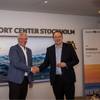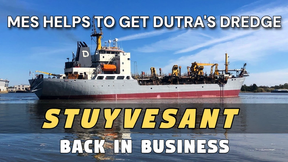Closer cooperation between flag states and class societies will help to minimize casualty damage to people, property and the marine environment and result in better casualty reports, Dr Hans Payer, chief executive of Germanischer Lloyd told top level representatives of the world maritime industry and flag states at the Mare Forum conference on Flag State Quality and Regulatory Governance in Athens on September 20, 2002.
"I urge flag states with ships involved in accidents to work closely with the class societies, especially when they operate Emergency Response Services (ERS) for the vessels in trouble", Dr Payer said.
"ERS schemes have proven their value in many cases, in keeping damage to ships and the environment to a minimum and in optimizing salvage operations. They are compulsory in US waters under OPA 95 for vessels carrying oil in bulk. ERS is however very helpful for any other type of vessel. The information from an ERS project is also an excellent source of material for a flag's casualty report. For these reason, I recommend flag states to encourage owners to subscribe to ERS services, even when they are not obliged to by OPA."
Dr. Payer said that class societies acting as a flag state's RO (Recognized Organization) can provide valuable technical assistance to the flag during a casualty episode and after, when they can assist in preparing the subsequent official casualty report. "This rarely happens, meaning that a source of widespread knowledge and expertise is not utilized. The many flag states that produce inadequate casualty reports could much improve them with this sort of assistance."
He said that in an accident such as a grounding or collision, an owner who subscribes to an ERS scheme operated by a number of societies, including GL, has immediate access to a computerized contingency planning system. "This round-the-clock service provides the owner and master with comprehensive plans and technical details of the ship, plus advice and assistance of a technical team on damage stability, residual strength, ballast management and salvage maneuvers.
Dr. Payer paid tribute to the ten flag states that had volunteered to participate in the proposed IMO Model Audit Scheme which he described as "a big step forward in safety at sea." "I commend these flag states for their courage, for the risk is that shortcomings in their own organizations may be exposed by the audit. But I firmly believe that openness and transparency are the attributes which will bring us forward today"
Sponsored Content
Empowering sustAInability: could NAVTOR innovations transform maritime operations?

Charting a Smarter Course: How Nautical Systems by ABS Wavesight is Powering the Future of Fleet Management

Subscribe for
Maritime Reporter E-News
Maritime Reporter E-News is the maritime industry's largest circulation and most authoritative ENews Service, delivered to your Email five times per week











